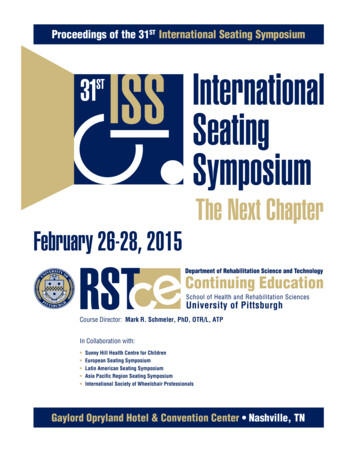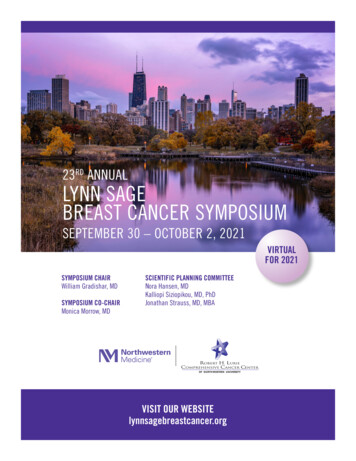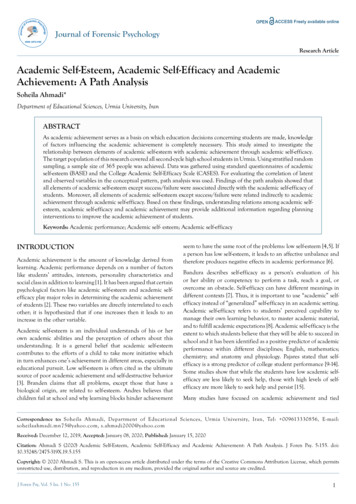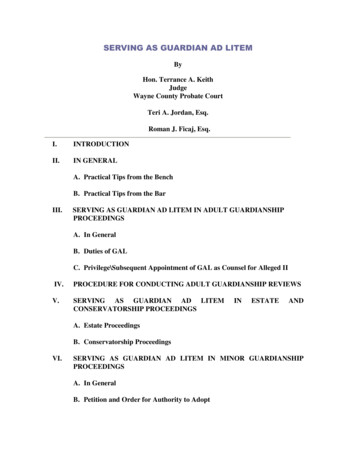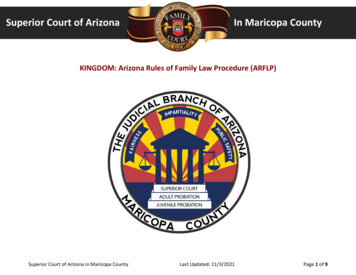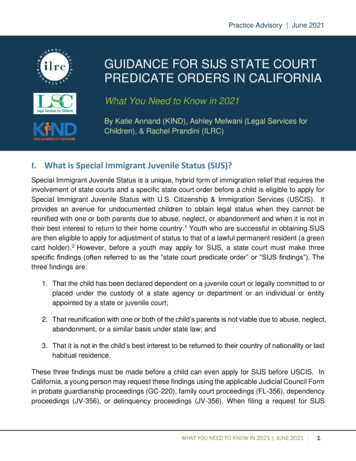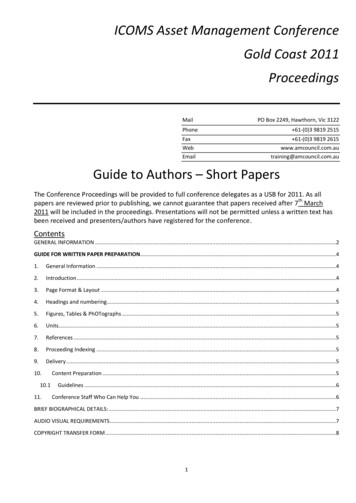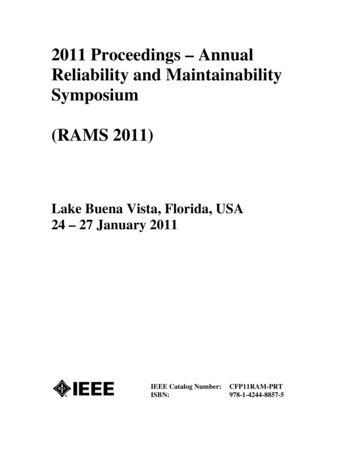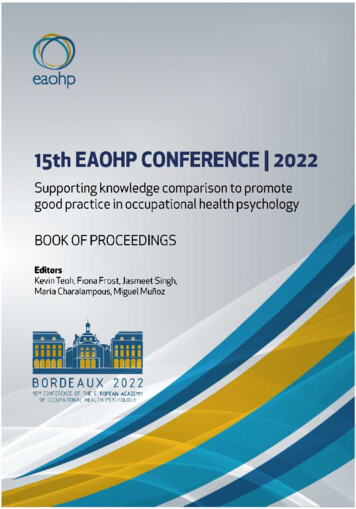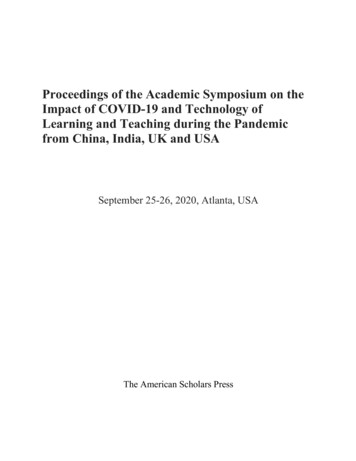
Transcription
Proceedings of the Academic Symposium on theImpact of COVID-19 and Technology ofLearning and Teaching during the Pandemicfrom China, India, UK and USASeptember 25-26, 2020, Atlanta, USAThe American Scholars Press
Editors: Lisa Hale Cox, Jin Zhang and Linda SunCover Designer: June ZhangPublished byThe American Scholars Press, Inc.Proceedings of the Academic Symposium on the Impact of COVID-19 and Technology ofLearning and Teaching during the Pandemic from China, India, UK and USA is published by theAmerican Scholars Press, Inc., Marietta, Georgia, USA.No part of this book may be reproduced in any form or by any electronic or mechanical meansincluding information storage and retrieval systems, without permission in writing from thepublisher.Copyright 2020 by the American Scholars PressAll rights reserved.ISBN: 978-1-7337122-7-9Printed in the United States of America2
Symposium OrganizationOrganizerInternational Forum of Teaching and Studies (IFOTS Journal)American Scholars Press, USACo-organizerSchool of International Studies, Zhejiang University, Hangzhou, ChinaOrganizing CommitteeChairProfessor Emerita Dr. Gabriele Strohschen, DePaul University, IFOTS Editor-in-Chief;Proprietor of The Pilsen Storefront Community Center, Chicago, USAMembersDr. Jin Zhang, American Scholars Press, USADr. Vincent Wiggins, Dean of Career and Continuing Education Programs at City Colleges ofChicago-Harry S. Truman College, USAMs. Deborah McPhee, M.S., Illinois Domestic Violence and Sexual Assault AwarenessCorporate Educator/Consultant, JRNI Certified Life/Business Coach, Certified DomesticViolence Advocate, USADr. Linda Sun, Kennesaw State University, USAAcademic CommitteeProfessor Emerita Dr. Gabriele Strohschen, DePaul University, IFOTS Editor-in-Chief, USADr. Linda Sun, Kennesaw State University, USADr. Max North, Kennesaw State University, USADr. Ronny Richardson, Kennesaw State University, USADr. Radwan Ali, Kennesaw State University, USADr. Ahmad Khan, Capella University, USAProf. Fang Fan, School of International Studies, Zhejiang University, ChinaProf. Yuhong Jiang, School of Foreign Languages, Shanghai Normal University, ChinaAssociate Prof. Zhang Yu, School of Foreign Languages, Zhejiang University City CollegeHangzhou, ChinaEditorial CommitteeLisa Hale Cox, American Scholars Press, USADr. Jin Zhang, American Scholars Press, USAJon Lindsay, American Scholars Press, USADr. Linda Sun, Kennesaw State University, USA3
IntroductionOn September 25, 2020, American Scholars Press (ASP) conducted its Inaugural Academic Symposiumonline in the platform of its International Forum of Teaching and Studies Journal (IFOTS). A collaborativeteam, led by Dr. Strohschen with Dr. Wiggins and USA-based university faculty members, and the staff ofthe American Scholars Press – IFOTS, brought together educators and students from around the globe. Thesix-hour symposium engaged experts in technology-mediated instruction in a discourse on the theme,Online Teaching & Learning: Challenges and Solutions. The goal was to address the effects of thepandemic brought about by the Covid-19 virus and explore the consequences for educators and students tolearn for future structures and practice. The symposium initially offered a platform for stakeholders in thischanged education environment to discuss challenges, solutions, and ideas, and to exchange results basedon their experiences in this worldwide rise of e-learning. With USA-, India-, and UK-based facultymembers of universities, colleges, and private institutions, the first IFOTS Symposium constituted a‘commons’ for considering international and trans-national perspectives and local experiences as a steptoward synthesizing contextually appropriate solutions for education anywhere in our americanscholarspress.us/symposium.php) focused us on models in the digital era; design of effective online courses; online teachingtechniques; the psycho-dynamics of distance education; and it addressed the challenges in aligningeducation formats and technology with the 21st Century learner. ASP has a 16-year history of reaching aninternational audience with its publications. Hence, this symposium sought to then broaden its readershipand contributor base by inviting further discourse that could advance relevant education praxes. Towardthis end, the symposium recordings were posted on an internationally accessible platform and the planningteam reached out to contacts, who would host and moderate viewings at their respective institution. In thisway, the limitations of international virtual symposia were overcome by offering local access at convenienttimes to a broad global audience. This approach strengthened awareness of the benefits of ASP and itsjournals in terms of trans-national exchanges and knowledge dissemination wherein practitioners can learnwith and from one another as much as it shared the insights gained at the Symposium. This effort connectedpractitioners with one another at the respective venue locality and with partners who participated in theSymposium.ASP partnered with universities in China, and six institutions participated in reviewing the Symposiumrecordings and conducting discussion. Each host site was responsible for moderating live discussions afterthe viewing of one or all the Symposium sessions at their respective site (f2f, virtually, or in a blendedformat). Based on emerging themes during these discussions, Chinese practitioners contributed insights,adding to current research and practices along with calling for future solutions. The English Department ofZhejiang University was instrumental in reviewing the Symposium recordings, conducting discussions, andsoliciting articles from professors and students. Zhejiang University, Shanghai Normal University, JinanUniversity, Nanjing University, Shenyang Aerospace University and Ningbo Tech University also invitedfaculty to review our Symposium recordings and contribute to this publication. Overall, more than 40 paperswere submitted from our Chinese colleagues alone and 31 of the peer-reviewed articles were accepted.This international collaboration across the academic community in USA and China capturedremarkable exchanges and insights, which are presented in this publication, Proceedings of the AcademicSymposium on the Impact of COVID-19 and Technology of Learning and Teaching during the Pandemic4
from China, India, UK and USA. Three key themes that emerged from the Chinese constituency’sconversations centered on teaching practices, post-pandemic research needs, and the transcultural relevanceof literature analysis. With teaching practices being the most prevalent theme, articles focus on ESL andEFL; language learning through literature; cultural understanding and meaning making; collocations inreading; aspects of functional-cognitive linguistics; semiotics; and online learning in language instruction.The second theme of research was multifarious as well, contemplating the need for assessment of onlineplatforms and how they align to instructional methods; the need to investigate how to improve theinformation technology skills of teachers; and the need for immediacy in research to developeffective combined offline and online teaching models. Thirdly, literature analysis interests emphasizedmodels that engage foreign literature for language learning; utilize literature to extract assessment criteriafor mutual understanding and building capacity for empathy; and analyzing the human conditions in generalthrough literature.This Symposium initiated a collaboration across the seas when we shared the session recordings andinvited further discourse by groups in China who reviewed the symposium presentations. We trust thisoutreach and connecting will lead to further exchanges and collaborative research among students,practitioners, faculty, and administrators as we begin to define the so-called, post-pandemic “new normal.”Our teaching and learning environment has changed; and it continues to change with increasingly moreemphasis placed on technology-mediated instruction and communication. While the processes and formatsare changing, the underlying education needs of all stakeholders in society undergo transformation as well,depending on the context of their reality. At the same time, the kind of fundamental human needs are ratherconsistently and universally shared among the peoples in the world. At the intersection of such needs thatcan be addressed with place-based, relevant, and meaningful education content and formats remains theneed for people to learn to know, learn to live together, learn to be, and learn to do for our globalcommon good. Toward such ends, American Scholars Press embraces trans-national collaboration such asour symposium and this collection of articles. We respectfully acknowledge the many contributions tocontinue the discourse which have been made by participants, at the IFOTS Symposium and subsequentlyduring local gatherings in China. We are pleased to present these proceedings, and we invite our readers tocontinue the discourse.Professor Emerita Dr. Gabriele StrohschenDePaul UniversityIFOTS, Editor-in-ChiefChicago, Illinois, USAJune 20215
Table of ContentsA Whole New World: Bitmoji Classrooms, Novice Teachers, and Traditionally Marginalized Students’Virtually Learning During a PandemicGeorge Ligon, IV . 13Teacher as Social Entrepreneur: A Paradigm Shift in Indian Teacher EducationKaranam Pushpanadham, Shnaoli Chakraborty Acharya . 20Graduate Level Accounting: Online observations and the age of COVID-19Dr. Elaine Gregory . 30Transition and Migration to Online Learning EnvironmentRonny Richardson and Max North . 35Flexibility, Effectiveness, and Collaboration: English Writing Center in Zhejiang Universityduring the PandemicFang Fan . 56How Online Education Influences Live Commerce of Agriculture Products duringthe COVID-19 PandemicShiyi Chen . 61A Discussion on Strategies of Ideological Education of College Students in Post-pandemic TimesGao Yu, Yuanyuan Miao . 70Challenges and Countermeasures of Psychological Health Education in Colleges and Universitiesduring COVID-19Yuanyuan Miao, Yu Gao, Xiao-ou Li . 76A Comparative Study on Online Translation and Post-editingQin Qian . 82Online British and American Literature Teaching During Covid-19 PandemicChen Yun-yi . 88The Innovation and Practice of the Course Construction of Police Professional Courses under theBackground of Post-epidemic PeriodJing Guping, Lee Rong, Wang Zhenhua . 94Discussion on the Countermeasures of Online Education under the Pandemic of COVID-19Luo Xiaoling, Yuan Shuangzhu, Wang Zhenhua . 101Online EFL Teaching during the COVID-19 Pandemic through the Eyes of a ChineseCollege English Teacher: A Case StudyXuan Chen, Lei Shen . 107A Probe into the PBL Teaching Mode Based on New Media Technology during the COVID-19Pandemic – A Case Study of English TeachingWang Bo, Zhang Yu . 115Reform of Management Course for Secretary Major in Higher Vocational Collegesin the Post Epidemic Era – Take the Teaching Content of Live-Broadcast Assistant as an ExampleLiu Yiyi, Yao Xintao . 1216
A Study on English Binominals in Chinese EFL Learners’ Essay WritingLiu Jingwen. 127The Transmutation of the Notion of Home in the Age of Mobility in Robert Stevenson’s WorksYaping Yu . 133Constructing the Unnarrated: On the Narrative Gaps in Nabokov’s Lolita from the Perspectiveof Theory of MindGuan Haijia . 139An Analysis of Multimodal Discourse Characteristics and Synergy of Modes in the Lead-in Partof English Teaching by using ELAN SoftwareJiasheng Lu, Yuhong Jiang . 145Seeking the Foundation of Life: The Meaning of Dignity in Ian McEwan’s The Children ActWang Jie . 152Three Aspects of Iconicity in the Irreversibility of English BinomialsJingwen Liu. 159Linguistic Functions and Features of Hedges in A Streetcar Named DesireSong Jie. 165Narrative in Plays: A Comparison between Susan Glaspell’s Trifles and “A Jury of Her Peers”Du Lanlan . 171Body in D. H. Lawrence’s Women in LoveWang Aisu . 177Teachers’ Cognition and Implementation of the Activity-Based Approach in the EFL Reading Class:Evidence from High Schools in ChinaYuhong Jiang, Xiaoying Feng, Wenjuan Qi . 184The Washback of the Summary Writing Task in the NMET Reformation on High School EnglishReading and Writing Teaching in Shanghai Municipality, ChinaXinyuan Pu, Yuhong Jiang, Yiqing Wang. 192Linguistic Philosophy and Writing Practice in Iris Murdoch’s Under the NetZhou Chengyi, Sun Yanping . 199The Broken Mask – A Study of Black-White Relations in Eugene O’Neill’sAll God’s Chillun Got WingsChen Dawei . 205Dilemma of Memory and Reconstruction of the Past in Kazuo Ishiguro’s The Buried GiantHao Xiangjian. 212A Quantitative Study on the Acquisition of Chinese Quantifiers in Early ChildhoodLi Hui. . 219Between Imagination and Reality: Research on Medieval English Morality PlaysYao Yao . 226Exploring Strategy Use of Chinese Postgraduates’ Group Peer Feedback in a Translation ClassMengtong Yu, Yuhong Jiang . 234The Influence of Association Strength, Phrasal Frequency and Contextual Predictabilityon the Processing of Chinese 4C CollocationsHui Li. . 2417
A Corpus-based Stylistic Study on Subtitles of Game of ThronesJing Zheng, Dali Hon . 249A Translation Analysis of “Frozen” Texts in Legal English under the Guidance of Register TheoryZhang Yu, Miao Kehui . 2568
Presentation AbstractsRevisiting Learning in Higher Education: Indian Model in Digital EraThe National Education Policy 2020 in India has recommended a paradigm shift in Higher Education withdue focus on digital learning and MOOCs. This presentation focuses on the key aspects of learning in highereducation, digital readiness, and institutional mechanisms. The session discourse intends to raise issues andchallenges, sharing Success stories of digital learning initiatives in India and other countries.Presenter: Professor Dr. Karanam Pushpanadham, The M S University of Baroda, IndiaHe is a member of the Research Group of Education for Rural Transformation, Department ofEducation, Stockholm University, Sweden and the Indo-Danish Academic exchange Program on Educationfor Global Citizenship with Efterschools of Denmark. He served as Visiting Professor at the AssumptionUniversity and Burapah University in Thailand. He directed International Training Programs (ITP) withLife Academy, Karlsted, Sweden sponsored by SIDA on ICT and Pedagogic Development. He directed anInternational Training program for the District Education Officers of Afghanistan funded by SwedishCommittee for Afghanistan, SIDA.Moderator: Professor Emerita Dr. Gabriele StrohschenHow to Design Effective Online CoursesMr. Langdon will present his learnings as a teacher and student using online platforms. The best approachis an integrated combination of approaches, combining prerecorded videos, worksheets, quizzes, onlinezoom sessions, zoom breakout sessions, and using Mural, Jamboard and Miro. Putting all this together cancreate a very effective learning experience.Presenter: Mr. Morris Langdon, London School of Economics & Innovation LabsMr. Langdon is an award-winning innovator and world-renowned innovation consultant. He is SeniorPartner at Innovation Labs LLC. He is also a founding partner of Future Lab Consulting, a strategy andtechnology firm that offers advanced blockchain solutions for global enterprises. He is Co-Chair of theInnovation Council at Red Team Engineering, and in 2017-2018 he served as Innovation Coordinator atSUNY's Fashion Institute of Technology in New York.Moderator: Deborah McPhee, M.A.How to Teach Difficult Detailed Subjects in the Online EnvironmentThis presentation addresses taking difficult, detailed subjects such as accounting or research designs intoan online format. In many cases these topic areas may be difficult for students who are not well-preparedfor a detailed subject that they are mostly unfamiliar with from their past education or work experiences.9
These subjects often require more one-on-one instruction or clarification. Subject mastery is also difficultto assess within the online environment. Online formats vary considerably in both technical capability andtime constraints adding to challenges and issues.Presenters: Dr. Elaine Gregory, Grand Canyon University and Dr. Cliff Butler, Capella UniversityDr. Gregory is a CPA and Certified Fraud Examiner who has been teaching online since 2017 atbachelors, masters, and doctoral levels, most recently at Grand Canyon University, Phoenix, AZ. She hasalso designed accounting curriculum for Thomas Edison State University and has worked with students atCapella University. Dr. Cliff Butler is the Research Chair of the School of Business and Technology atCapella University where he has taught online since 2001.Moderator: Dr. Ahmed KhanThe Psycho-dynamics of Distance Learning: The Online Discussion RoomThe psycho-dynamics of online course discussion rooms are potent forces influencing learner engagementand success. Group-based culture development, the emergence of behavioral norms, and diverse modes ofcommunications converge to establish discussion room cultural and learning context. While there aresimilarities between ground-based classroom and online discussion room learning activities, onlinediscussion rooms often create domains-of-silence characterized by episodic and thematically fragmentedcommunications within self-organized primary and secondary learner groups. These domains-of-silenceinfluence learner isolation and can negatively impact academic success. Also, unlike ground-basedclassroom engagement, which employs group work as a learning strategy, the asynchronous format used inonline education can hinder individual student course progress. Instead, the online discussion roompromotes individual learning, discussion board participation readiness, and response time flexibility. Twoimportant characteristics of group learning include relationship building and performance support. Whilegroup learning appears to be increasing in online course work, pedagogically, individual learning remainsthe dominant instructional modality. The confluence of conditions, episodic and thematically fragmentcommunication, minimal emphasis on group learning, and the absence of substantive relationship building,and performance support can potentially inhibit students in the online course discussion room. Central toinhibiting learning is disconfirmation, learning anxiety, and survival anxiety and the associated remediesassociated with creating psychological safety. This presentation will address the psycho-dynamics presentin the online course discussion room. The presenters will present psychological factors inhibiting learningincluding disconfirmation, learning anxiety and survival anxiety. In addition, strategies for minimizing theeffect of these factors such as establishing psychological will be evaluated and discussed.Presenters: Dr. Michael Williams, Thomas Edison State University and Dr. Tami Moser, SouthwesternOklahoma State UniversityDr. Michael Williams, Ph.D., MBA is the Dean of the School of Business and Management at ThomasEdison State University in Trenton, NJ. As the school's chief academic and administrative officer, he leadsall aspects of the school's scholar-practitioner focused degree programming. Dr. Williams is the founderand principal consultant for Psychological Practice Services, an international consultancy specializing in10
business development for mental health professionals. He is an Accreditation Council for Business Schoolsand Programs (ACBSP), evaluation team leader, a 2018 ACBSP Dean's Symposium presenter, and anACBSP Region 1 Best Presentation Winner. Dr. Williams's research, publishing, and presentation interestsinclude the influence of modern psychoanalytic theory on leadership efficacy, workplace bullying, and theinfluence of mental illness on workplace productivity. Dr. Williams earned a Ph.D. in EducationalLeadership, Policy, and Administration and an MS in Human Resource Management from FordhamUniversity. He earned a multidisciplinary graduate degree; an MS in Labor and Employee Relations fromRutgers University, an MBA in Management from DeVry University, an MS in Mental Health Counselingfrom Touro College and University Systems, and an MA in Psychoanalysis from the Academy of Clinicaland Applied Psychoanalysis, Boston Graduate School of Psychoanalysis.Dr. Tami Moser is the Chair of Pharmaceutical Sciences, Professor of Pharmacy Administration, andthe Coordinator of the Center of Excellence in Pharmacy Leadership, Innovation, and Quality Outcomes atSouthwestern Oklahoma State University. Her research focuses on the improvement of quality outcomesand patient experience in healthcare settings. Tami's most recent publication is Workflow Improvement andthe Use of PDSA Cycles (Quality Management in Health Care, 2020). She served as the Editor-in-Chiefof the Administrations Issue Journal for ten years. She has earned a Ph.D. in Organization and Managementand a Doctorate in Behavioral Health. Tami is an ICU Master Trainer, Consultant with Dahlia Consultinggroup, and a Coach. Her coaching practice focuses on Ph.D. and Professional Doctorate students seekingmentorship, support, and guidance throughout their doctoral journey.Moderator: Dr. Vincent WigginsTransition and Migration to Online Learning EnvironmentThis presentation reports gauge the possible impacts on student learning due to online conversion. A threestage evaluation process was conducted. First, a survey of the faculty regarding their opinion of how therest spring semester played out for those courses that were converted. Second, surveying students who hadgone through the conversion. Third, compare the results from selected traditional courses with comparableonline courses. Overall, while many faculty were not familiar with the online teaching format, they weresatisfied with the process and learning outcomes. Students also overall showed satisfaction with transitionto online.Presenter: Dr. Ronny Richardson, Kennesaw State UniversityDr. Ronny Richardson is a professor of Operations Management at Kennesaw State University. He hasover 25 years of teaching experience. He holds a Ph.D. in Operations Management, MBA, and MS inDecision Sciences. He worked for 20 years as an analyst at Georgia Power Company. He has 25 yearsteaching experience at both private and public universities, with nine years as department chair at SouthernPolytechnic State University.Moderator: Dr. Max North11
Challenges in Aligning the Education Format, and Technologywith the 21st Century LearnerThe presentation explores possible misalignment between the traditional structure of academic courses, theemerging trend of online instruction, and the mindset of the students who thrive in an online environment.The discussion encourages to explore if converting the traditional course format to an online format issufficient to align with the paradigm of the 21st century learner.Presenter: Dr. Ahmad Khan, Capella UniversityDr. Khan completed his initial degrees in the field of network engineering and earned his terminaldegree in management. He is a certified life coach. He works as a systems engineer and a data scientist inthe telecom industry, and as an educator with the Capella University. Dr. Khan draws from his diverseinsights to study machine and human systems and enjoys exploring efficiency improvements.Moderator: Dr. Cliff Butler12
A Whole New World:Bitmoji Classrooms, Novice Teachers, and Traditionally MarginalizedStudents’ Virtually Learning During a PandemicGeorge Ligon, IVedCount, LLC, Alexandria, VA, USA[Abstract] As a result of the COVID-19 pandemic, a large local “urban” school district chose virtual learningto start the 2020-2021 school year. I decided to support a traditionally low-performing school with an entirelytraditionally marginalized student population in this district. I will share my experience as a STEM InstructionalCoach supporting Math and Science teachers and the challenges we faced teaching traditionally marginalizedstudents in a completely virtual environment. I will share some of the strategies and supports we leveraged tocombat many of the issues related to school district policy changes, student absenteeism, engagement,instructional quality, teacher burnout, and student outcomes.[Keyword] COVID-19; traditionally low-performing; traditionally marginalized; virtual learningIntroductionDuring the fall of 2019 through the spring of 2020, COVID-19 (COVID) swept through the world like araging wildfire. Many developed nations fell victim to the spread of COVID because of international travel.COVID was an airborne virus and easily transmitted between people who were within six feet of each otherthrough respiratory droplets in the air. The United States of America, along with many other nations,enacted national lockdowns to contain the spread of the virus. As a result, every aspect of society requiringsocial interaction between people shut down unless it was essential for survival.COVID forced us all to rethink how to function in society with a global pandemic. The federalgovernment enacted social distancing guidelines, and schools across the nation made plans to educatestudents virtually to start the 2020-2021 school year.My Call to ArmsA good friend and former colleag
Dr. Max North, Kennesaw State University, USA Dr. Ronny Richardson, Kennesaw State University, USA Dr. Radwan Ali, Kennesaw State University, USA Dr. Ahmad Khan, Capella University, USA Prof. Fang Fan, School of International Studies, Zhejiang University China Prof. Yuhong Jiang, School of Foreign Languages, Shanghai Normal University, China



